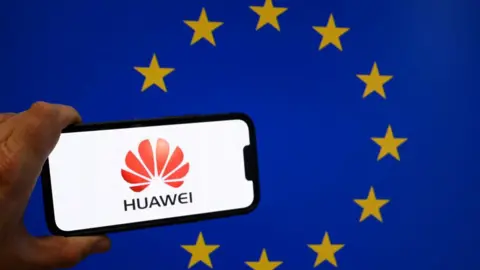In a significant development concerning allegations of corruption within the European Parliament, Belgian authorities have launched a series of raids across the country as part of a comprehensive investigation. This inquiry notably links the Chinese tech giant Huawei to accusations of engaging in corrupt practices disguised as commercial lobbying. The case has prompted extensive scrutiny of Huawei’s activities in Brussels since 2021 and has resulted in multiple arrests and detentions of individuals associated with the company.
The Belgian police executed these raids, targeting multiple locations, and extended their investigations beyond national borders, as police in Portugal also conducted searches at specific addresses, and an individual was taken into custody in France. The extent of the operation highlights the seriousness with which Belgian prosecutors are treating this case, which alleges systemic corruption that has reportedly occurred regularly and discreetly since 2021. Under the guise of lobbying, the corruption is described as taking various forms, including remuneration for political positions, lavish gifts such as travel and food expenses, and the hosting of influential individuals at various events, including football matches.
In a statement addressing the allegations, Thai Lin, the spokesperson for Huawei, emphasized the company’s strict zero-tolerance policy towards corruption and underlined its commitment to adhering to all relevant laws and regulations. Huawei aims to distance itself from these accusations, asserting that the company will pursue decisive action to clarify its standing in this ongoing investigation. Their swift response to the charges reflects a broader corporate strategy to mitigate reputational damage and address governance concerns in light of international scrutiny.
Reports from Belgian newspaper Le Soir suggest that the investigation centers on lobbyists connected to Huawei, who allegedly bribed current and former Members of the European Parliament (MEPs) to advocate for the company’s trade agenda. According to the findings, the expansion of Huawei’s influence within the European Parliament might be linked to efforts to secure advantageous terms for their business operations in Europe. This aspect of the investigation is particularly concerning, given the intersection of technology, politics, and potential malfeasance amid rising geopolitical tensions involving China.
The Belgian prosecutor’s office has confirmed that as part of this operation, two offices inside the European Parliament have been sealed following the directions of a presiding judge over the case. However, it is noteworthy that no MEPs were directly implicated in the raids conducted to date, suggesting a focus more on the lobbyists and intermediaries rather than the parliamentarians themselves. Altogether, a total of 21 orchestrated raids occurred in various locations including Brussels, Flanders, and Wallonia.
As the investigation unfolds, authorities have conveyed their intention to delve deeper not only into the allegations of corruption but also into possible forgeries and the usage of falsified documents, which they believe may be part of a wider criminal organization. The prospect of discovering money laundering channels adds an additional layer of complexity to the case, potentially revealing further unethical practices that extend beyond lobbying and into the financial operations of entities involved.
This multifaceted investigation will undoubtedly have far-reaching implications, not just for Huawei, but for the European Parliament’s integrity and the broader landscape of commercial lobbying in the EU. With public trust in governmental institutions increasingly under threat, the outcome of this inquiry may lead to significant reforms aimed at increasing transparency and accountability within the realm of lobbying and political engagements in Brussels and beyond.



